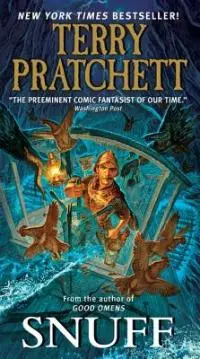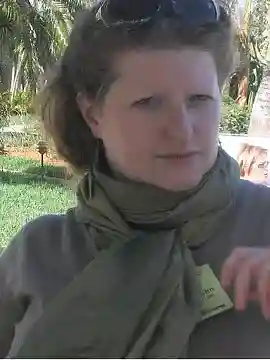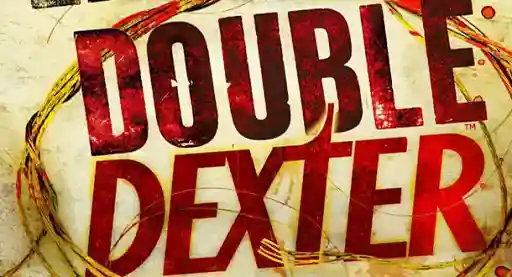In the UK, you can’t board a train without seeing someone reading a Discworld novel. For twenty five years now, people have been reading about the activities of a world that sits on the back of four elephants who stand on the turtle the Great A’tuin as it swims through space. Once a light parody of sword and sorcery fantasy, the Discworld [series] grew in depth and complexity and emerged as a vehicle for some rather profound political thinking and a lot of humour.
For a long time now, the new Discworld novel has been a highlight of the reading season, and Snuff will be the 39th novel and the eighth in the Commander Vimes sub-series. Commander Vimes, once a lowly sergeant in Ankh-Morpork City Watch, and now Duke of Ankh-Morpork is married to the richest Lady in the City. Vimes has taken a long time to grasp just how rich he now is, and how much of the city he now owns. Now Vimes, a man who has never seen a cow outside an abattoir, has to come to terms with the idea that he owns landscape.
Vimes, it seems, needs a holiday. Both Vetinari and Lady Sybil are quite insistent on this and Vimes, “Vetinari’s terrier,” must heed his master’s (and mistress’s) voice. Off the family go to the Ramkin family estates outside the city of Ankh-Morpork where the city’s writ does not run and Vimes is, therefore, ipso facto, out to grass. Young Sam is now six years old and a bright and bonnie chap, with every bit of his father’s curiosity for how the world works, but where Vimes is interested in the midden of human existence, Young Sam is—thanks to the writings of children’s author Miss Felicity Beedle—mostly just interested in the midden. It is a joy to see the way in which Young Sam’s search for the largest shit is paralleled by that of his father.
 Vimes, of course, must needs fall over the huge pile of rotting social excrement that is country politics unalleviated by any centralised influence. He quickly discovers a self-appointed magistracy based on local land-ownership (from which he is mysteriously excluded. Surely as the local landowner he would automatically have a place on the bench?), and worse, in the eyes of a Sam Vimes, a complacent and docile locale population who do not realise that in their hoes and bill hooks, their hammers and their sickles, they own the means of resistance.
Vimes, of course, must needs fall over the huge pile of rotting social excrement that is country politics unalleviated by any centralised influence. He quickly discovers a self-appointed magistracy based on local land-ownership (from which he is mysteriously excluded. Surely as the local landowner he would automatically have a place on the bench?), and worse, in the eyes of a Sam Vimes, a complacent and docile locale population who do not realise that in their hoes and bill hooks, their hammers and their sickles, they own the means of resistance.
When the smith disappears, Vimes finds himself the subject of an inept conspiracy, which inevitably leads to an investigation which uncovers a slave trade in the local goblins, dismissed as vermin by all right thinking people. Of course, Vimes is not very right thinking, and supported by Miss Felicity Beedle, who has been teaching the goblins to read and to play the harp, and by a lone local constable who has been thinking quite hard about what the magistrates have asked him to do as opposed to what he has learned from Sam Vimes, Vimes rushes off to rescue the goblins.
In this latest outing for Commander Vimes, it is a pleasure to see Pratchett return to form. The last three Discworld books have been problematic: in Making Money, Vetinari seemed oddly dull, easily outwitted by Moist von Lipwig. The humour retreated to one liners, and the plot flapped wildly in the manner of Sourcery or Pyramids. In Unseen Academicals, the orc was rescued all too easily from opprobrium and the romantic sideline undermined the most interesting character who I had rather looked forward to seeing setting up her own pie emporium. In I Shall Wear Midnight, Nanny Ogg didn’t quite ring true, and there were more acts of self discovery and romance that did not seem to be as stitched into the story as we have come to expect. Snuff avoids most of these problems: the humour is back to its carefully structured riffs and buried pleasures (1), and all the plot-ends are neatly tucked in. However, there are times when Pratchett has not quite thought through the political structures he sets up, and there is one major character inconsistency that had me wondering if we were in an alternate world.
It was Vimes’ investigation that gave me reason to pause: at the end of Thud when the Summoning Dark leaves Sam Vimes, Vimes decides, “It was all mystic, that was what it was. Oh, it might all be true, but how could you ever tell? You had to stick to the things you can see.” (Corgi pb. P. 405) This is the Sam Vimes that we have come to know, deeply suspicious of magic, and unwilling to allow magic into the law. How, after all, can you tell the difference between a truth spell and a coercion spell? Years have passed since Thud Vimes has apparently found out: in Snuff, Vimes not only accepts the existence of the Summoning Dark, he takes it on board as an ally and accepts a witness statement. Alongside this is an uncharacteristically unsophisticated Sybil ex machina which sorts out anti-goblin prejudice in one sweep of the curtain. Both Vimes and Pratchett know this is not how the world works. Not even on the Discworld.
1. Amused to notice “Surprised you!”, played to greet Vimes as King of the River, is the Autocratical Anthem played by the Hemulic Band in Tove Jansson’s The Exploits of Moominpappa, Translation, 1952).
Get Snuff at Bookshop or Amazon

About the author
Farah Mendlesohn is the author of Diana Wynne Jones the Fantastic Tradition and Children's Literature, The Inter-Galactic Playground: Science Fiction for Children and Teens; and the award winning Rhetorics of Fantasy. She also co-edited the Cambridge Companion to Science Fiction which won the Hugo Award in 2005 and Terry Pratchett, Guilty of Literature with Andrew M. Butler and Edward James in 1998. She is currently writing a history of Children's Fantasy LIterature in English with Michael Levy of Wisconsin Stout, for Cambridge University Press, and will shortly publish the Cambridge Companion to Fantasy Literature (co-edited with Edward James).








